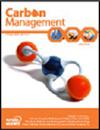缓解能源创新对资源诅咒的作用:以经合组织国家为例
IF 3.2
4区 环境科学与生态学
Q3 ENVIRONMENTAL SCIENCES
引用次数: 1
摘要
本文章由计算机程序翻译,如有差异,请以英文原文为准。
Alleviating role of energy innovation on resource curse: a case of OECD countries
Abstract The research motivates to provide some implications about the role of energy innovation (EINN) in the resource curse hypothesis. The significance of EINN is crucial for mitigating the economic and environmental damage caused by the excessive consumption of natural resources (NR). The study aims to inspect the effect of energy consumption (EC), EINN, and NR on the economic growth (EG) of OECD countries from 1990 to 2015. The study emphasizes the importance of EINN by incorporating the EINN in the empirical framework of the resource curse hypothesis (RCH) and contributes to the current research on RCH. The study has used the various advanced econometrics techniques that are robust in controlling the cross-section dependence (CD) and slope heterogeneity of the panel data. The results clarify that EINN is a decisive factor in the analysis of the RCH. The positive association between EINN and EG suggests that EINN is beneficial in improving the EG of OECD countries. The results reveal the negative impact of NR on EG; however, with the inclusion of EINN, the absolute value of the NR’s effect has declined significantly from −0.299% to −0.076% in the long run. The findings suggest that improvements in the EINN are crucial to increase the efficiency and productivity of NR and to avoid the RCH in the OECD countries. Thus, OECD countries should encourage energy innovation policies by promoting their application, so that replacement of traditional energy sources with new energy can be realized. HIGHLIGHTS The importance of energy innovation is expressed in the context of the natural resource curse hypothesis (RCH). Advanced panel data method CS-ARDL is used to control the panel cross-sectional dependence and slope heterogeneity issues. Energy innovation plays a decisive role in alleviating the RCH in the OECD countries.
求助全文
通过发布文献求助,成功后即可免费获取论文全文。
去求助
来源期刊

Carbon Management
ENVIRONMENTAL SCIENCES-
CiteScore
5.80
自引率
3.20%
发文量
35
期刊介绍:
Carbon Management is a scholarly peer-reviewed forum for insights from the diverse array of disciplines that enhance our understanding of carbon dioxide and other GHG interactions – from biology, ecology, chemistry and engineering to law, policy, economics and sociology.
The core aim of Carbon Management is it to examine the options and mechanisms for mitigating the causes and impacts of climate change, which includes mechanisms for reducing emissions and enhancing the removal of GHGs from the atmosphere, as well as metrics used to measure performance of options and mechanisms resulting from international treaties, domestic policies, local regulations, environmental markets, technologies, industrial efforts and consumer choices.
One key aim of the journal is to catalyse intellectual debate in an inclusive and scientific manner on the practical work of policy implementation related to the long-term effort of managing our global GHG emissions and impacts. Decisions made in the near future will have profound impacts on the global climate and biosphere. Carbon Management delivers research findings in an accessible format to inform decisions in the fields of research, education, management and environmental policy.
 求助内容:
求助内容: 应助结果提醒方式:
应助结果提醒方式:


